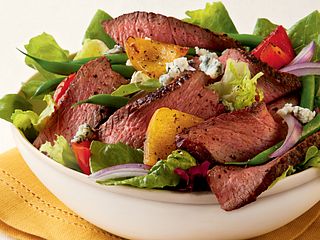BEEF'S NUTRITION BENEFITS
Beef is an excellent source of protein and supplies 10 essential nutrients including B-vitamins, zinc, and iron that support an active and healthy lifestyle. The nutrients in beef provide our bodies with the strength to thrive throughout all stages of life. Learn more about beef’s nutrients below.
NUTRITION Tips for student athletes

Following basic sports nutrition tips can help student athletes play to the best of their competitive ability. Student athletes are just like any other athlete; they want to perform at their best, and the regular exercise and physical demands of student sports requires a well-balanced meal plan.
BEEF NUTRITION EDUCATION HUB

The Beef Nutrition Education Hub, managed by a team of nutrition scientists and registered dietitians, is an education portal tailored to support the needs of the health and nutrition community. Create an account, access on-demand courses and earn complimentary continuing professional education credits approved by the Commission on Dietetic Registration.
EVERY BITE COUNTS - FEEDING BEEF IN THE EARLY YEARS

Every bite your baby takes counts, especially in the first 24 months of life. Starting your baby with beef as a complementary first food can ensure they get the nutrients they need for healthy growth and development.
BEEF HELPS MAKE EVERY BITE COUNT FOR TWEENS AND TEENS

The tween and teen years are a time of transformational change and increasing independence, and adolescents’ nutrient needs set the stage for optimal health and reduced chronic disease risk during adulthood.
THE CONNECTION BETWEEN BEEF'S PROTEIN AND STRENGTH

Beef's nutrients, along with a healthy lifestyle, work to provide our bodies and minds with the fuel to be the strongest versions of ourselves. See beef's nutrients in action and learn how they can support mind and body strength at all stages of life.
6 REASONS TO FEED BEEF TO YOUR BABY

Nutrition science constantly evolves, and the past several years have seen dramatic changes in nutrition and feeding recommendations for infants and toddlers. The 2020-2025 US Dietary Guidelines for Americans are the first to issue specific dietary recommendations for ages birth to 24 months. And even though less than 10% of infants eat beef in their first 12 months of life, these updated guidelines are encouraging parents to introduce nutrient-dense foods, like beef, to make every bite count in these early years.
BEEF AND IRON - WHY IT REALLY MATTERS

The first 1,000 days of life, from the moment of conception until a child is two years old, is an important period for brain development. Many nutrients found in beef play a role in building the brain structure and enhancing its function, including protein, iron, zinc, choline, polyunsaturated fatty acids, and iodine, to name a few.
BEEF'S PROTEIN

If there was a protein contest, beef would surely be crowned the king! One 3 oz. cooked serving of beef provides 25 grams, roughly 50% of your Daily Value, of this important nutrient that supports strong, lean bodies—making it an excellent source!
LEAN BEEF

We all know that beef tastes great, but did you know how good it is for you too? A 3 oz. cooked serving of lean beef provides 10 essential nutrients in around 170 calories, less than 10 grams of total fat and less than 95 mg of cholesterol.
BEEF'S NUTRIENTS

When it comes to beef and your health, you can rest easy knowing that along with being delicious, beef contains important nutrients. In just one 3 oz. cooked serving, you’re getting 10 essential nutrients including protein, zinc, iron and B vitamins.
BEEF and heart health

Research shows that lean beef can be part of a heart-healthy diet, and even help lower cholesterol as part of a healthy diet and lifestyle.
nutrition for all ages

Beef provides our bodies with the fuel and strength to thrive throughout all stage of life- from infancy to adulthood.
beef faq

Check out some answers to your most pressing questions when it comes to incorporating beef into a heart-healthy lifestyle.
RESOURCES FOR HEALTHCARE PROFESSIONALS
Beef is an excellent source of protein and supplies 10 essential nutrients including B-vitamins, zinc, and iron. Discover resources to help promote and share the nutritional benefits of beef.

BEEF NUTRITION EDUCATION HUB
The Beef Nutrition Education Hub, managed by a team of nutrition scientists and registered dietitians, is an education portal tailored to support the needs of the health and nutrition community. Create an account, access on-demand courses and earn complimentary continuing professional education credits approved by the Commission on Dietetic Registration.
